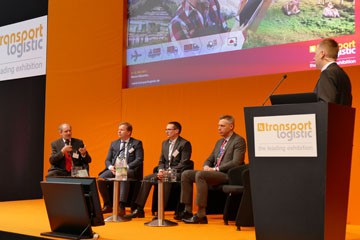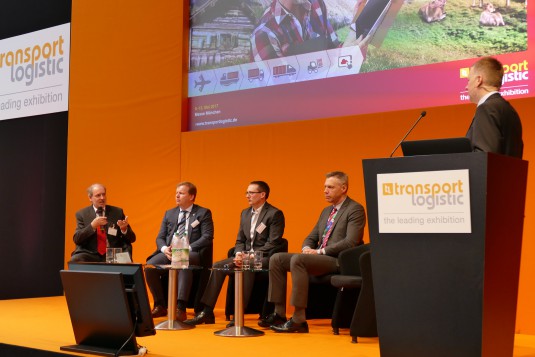

EMMA workshop at Transport Logistic Exhibition Forum on 11/5/2017
Project EMMA participated at the Transport Logistic exhibition, which is organized at Messe München from the 9th of May to the 12th of May.
As a part of the conference program, EMMA Forum workshop took place on Thursday, the 11th of May, at 10:00 – 11:30.
Speakers and Topics of the EMMA Forum Workshop:
- Moderator: Gunnar Platz, Managing Director, PLANCO Consulting GmbH
- Inland Navigation in the Baltic Sea Region – The Cooperation Project EMMA
Stefan Breitenbach, Head of Project Department, Port of Hamburg Marketing - Integration of Inland Navigation in Transport Chains – The Role of Inland Ports
Boris Kluge, Managing Director, Federation of German Inland Ports - Sweden’s Implementation of Inland Navigation – Chances and Challenges
Johan Lantz, CEO, Avatar Logistics - RIS Applications for a Better Integration of Inland Navigation in Transport Chains
Nils Braunroth, Technical Director RIS, German Federal Ministry for Transport and Digital Infrastructure
The result of the discussion
Information services increase the huge potential of inland navigation
Inland waterway transport has a huge potential, which could be used more efficiently in many regions – especially since there is an increasing transport demand in areas such as car manufacturing logistics. Inland shipping is an efficient, environmentally friendly and safe mode of transport, and its benefits increase with the help of new information services.
This became clear at the Transport Logistic fair in Munich where an expert panel discussed how to strengthen inland shipping in the Baltic Sea Region. The panel was organized by the Interreg Baltic Sea Region project EMMA, which has joined forces from five Baltic Sea Region countries to enhance inland navigation in the area.
“Developing inland shipping is possible also without expensive infrastructural investments like stretching of rivers. In the project EMMA we concentrate on small measures that still have a big impact on the countries. We are testing new solutions and make use of them also in other regions. This way the national pilots and solutions can eventually benefit the whole inland navigation sector”, explained Gunnar Platz, Managing Director of PLANCO Consulting and Project Manager of project EMMA.
In Sweden, for instance, the media and numerous spectators had an opportunity to see the first container barge transport from Port of Gothenburg to Port of Vänersborg via Göta älv River that demonstrated a new logistics concept in Sweden.
“We took care of the whole logistics chain for the customer and demonstrated that inland waterway transport is a sustainable option in Sweden where inland navigation might not even be considered as an option to rail or truck transport. After this successful demo, I am aiming to create an inland waterway transport solution in Sweden based on an inland barge from Holland”, told Johan Lantz, CEO of Avatar Logistics.
The integration of inland navigation into transport chains is an essential task, and here the role of inland ports is crucial. Inland waterway shipping is a practical and flexible option for transporting high and heavy objects such as transformers or fans for windmills.
“Short-sea shipping provides a good solution also for car manufacturing logistics. In the South-East Europe, two million new cars are manufactured per year. There are new markets for premium cars, and car export is increasing to the East”, explained Boris Kluge, Managing Director of the Federation of German Inland Ports.
Inland waterway transport helps to avoid congestion on roads and rails, especially as the road and rail infrastructure is already overloaded in some parts of the Baltic Sea Region.
“Shipping is a safe and environmentally friendly mode of transport in a world that is more and more dependent on local, regional and global trade. River information services combine inland navigation better in the logistics chains and contribute to its competitiveness. Information on lock management for instance helps to optimize transport operations and this way lower fuel consumption”, said Nils Braunroth, Technical Director at the German Federal Ministry of Transport and Digital Infrastructure.
The new German legislation makes for instance position data available for transport logistics.
“This creates transparency for inland shipping and in my opinion this a huge progress”, concluded Boris Kluge.


Email: breitenbach@hafen-hamburg.de Tel: +49 40 37709 121